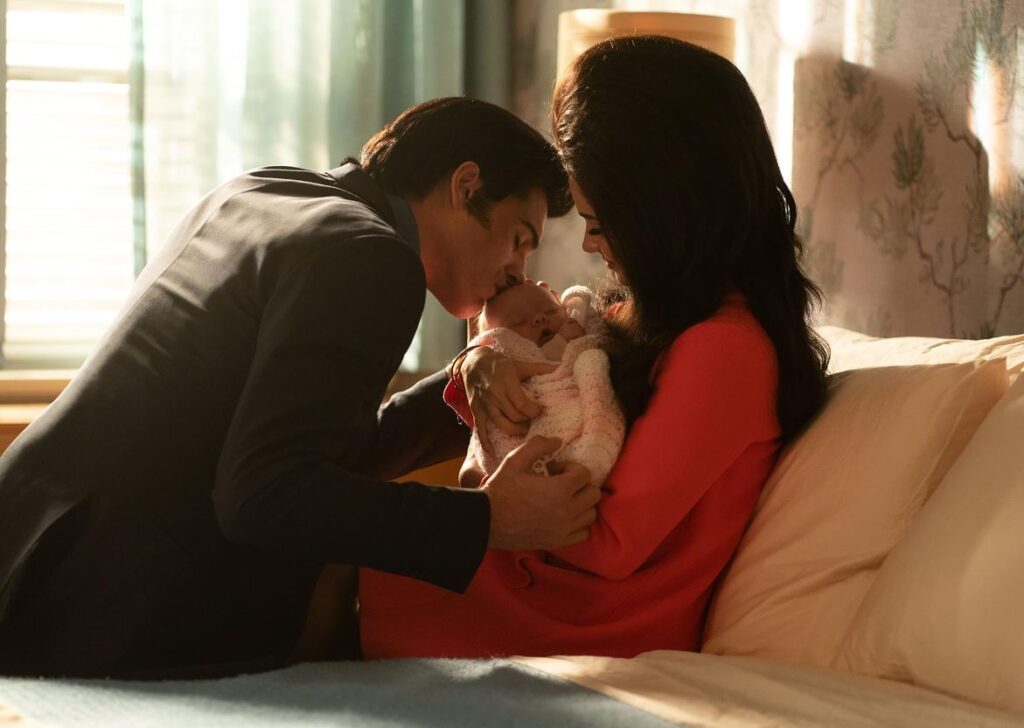If Baz Luhrmann’s 2022 Elvis is Elvis Presley’s story, then Sofia Coppola’s Priscilla is Priscilla Presley’s story. There is no comparison. Both are essential viewing.
Coppola opens the film in 1959 at a diner in West Germany. A young Priscilla (Cailee Spaeny) is approached by a military guy, asking if she likes Elvis. “Of course. Who doesn’t?” replies the flushed young girl in her soft, whispery voice.
The man then invites her to go to Elvis’s house party. And thus begins their love story. She was 14, he was 24.

Coppola, whose work focuses on female-centric narratives, invites the viewer to step into the shoes of the wife of the King of Rock N’ Roll.
The audience becomes an observer. We are given intimate access to witness Priscilla under the spell of Elvis (Jacob Elordi): her first blush of infatuation, the first time she steps inside Graceland, the first kiss, when she climbs into bed with Elvis.
The viewer becomes one with Priscilla, with Coppola never losing focus on giving us just her perspective. She is also careful not to over-explain, and instead trusts the audience to rely on visual clues to examine Priscilla’s inner world.
Based on Priscilla Presley’s 1985 memoir Elvis and Me, Priscilla is also a coming-of-age drama as much as a sad chronicle of Priscilla’s life as the wife of the Elvis Presley.
Coppola captures Priscilla’s thrill of being “chosen” as Elvis’ girl, particularly in scenes in her high school where she is endlessly distracted with thoughts of him and bewildered by her “luck,” and also the confusing treatment she receives from Elvis.
Elvis here operates in the margins of the film, not given the spotlight. But he is omnipresent, occupying every inch of her life: He is her fantasy, her desire — and her owner. She is intoxicated by the gift of his attention, losing her agency and her voice.
Spaeny, who won the best actress award at last year’s Venice Film Festival for this role, perfectly captures the naivete and innocence of a girl swept away by a man’s looks, celebrity status and attention. She loses her self-respect and becomes a meek, obedient (and decorative) pet.
Quiet, ruminative
It’s a quiet, ruminative film with minimal but concise dialogue, but nevertheless explosive for its revelations. Coppola employs her usual visual aesthetic — soft, tender and dreamy lensing care of Oscar-winning cinematographer Philippe Le Sourd — to deliver a true-to-life dark fairy tale.
Coppola and Le Sourd frame Spaeny’s Priscilla in a claustrophobic pastel-colored world — in a constant dream-like state of being Elvis’ girl, but also a child trapped in an abusive marriage, which she is too blind to see due to her limerence.
The moment Coppola gives a close-up of Priscilla on the sofa, breathless with intense admiration as Elvis plays on the piano at the party where it all began, the film immediately sets the off-kilter dynamic of their relationship. He is a superstar awestruck by her beauty. She is a fan, in disbelief at Elvis’ interest in her.
While Elordi’s Elvis is distractingly too tall and Spaeny’s Priscilla is too short, the height difference becomes somewhat symbolic. He is too big in her life, and she is too small to advocate for herself. This physical gap also underscores the predatory nature of their relationship.
Elvis is disturbingly controlling here and inflicts emotional abuse on Priscilla, whom he calls “Little One,” and denies her right to be offended. She is a literal bird in a gilded cage.
But the film does not invite judgments — it merely asks you to immerse in Priscilla’s mental and emotional state. For us to analyze Elvis’ actions toward her, then you need to revisit Luhrmann’s film, which provides a glimpse into his own tragedies and experiences of abuse under his controlling manager.
Priscilla is a well-crafted drama, with Coppola delivering an assured script and direction. It’s a painterly, visually gorgeous examination of the tragic power imbalance at the heart of a fabled celebrity marriage.
4 out of 5 stars / Now showing in Philippine cinemas
